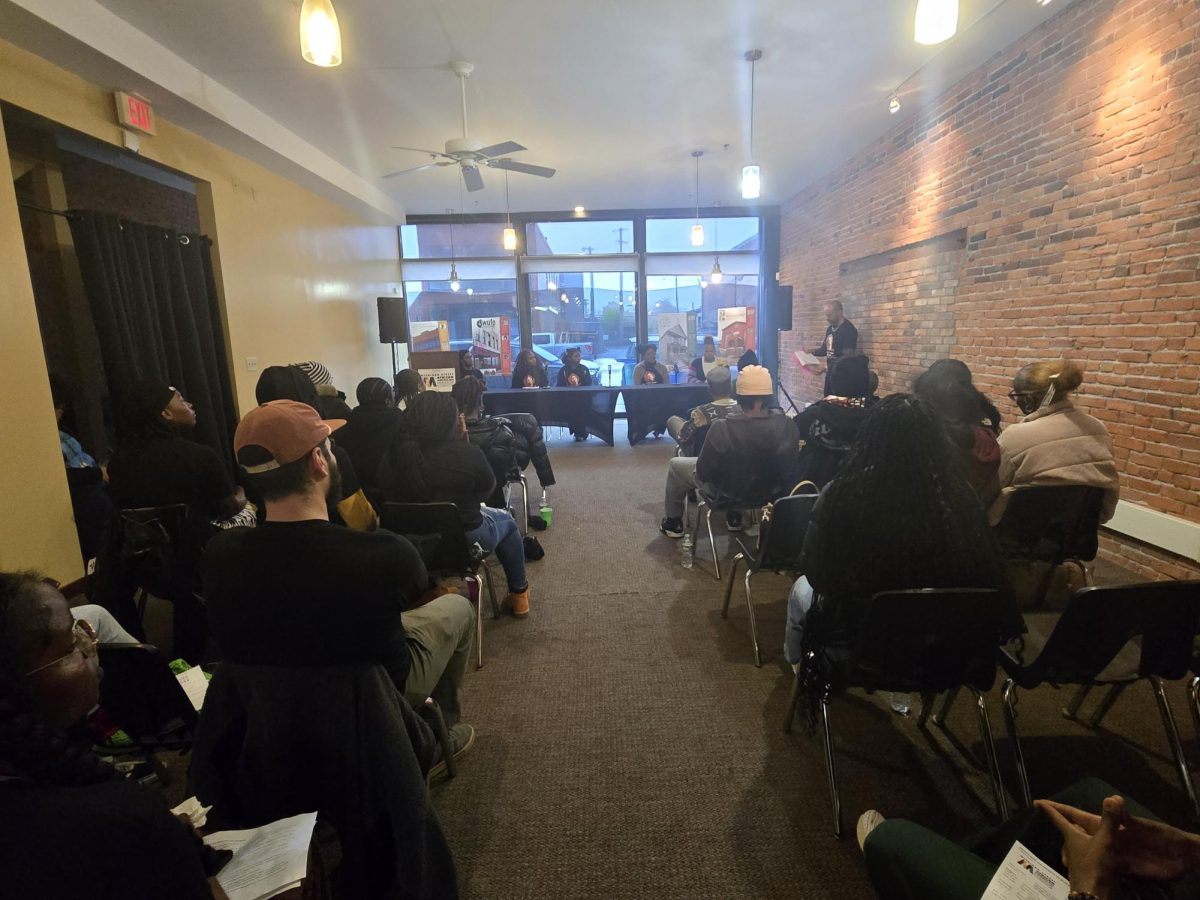Societal stigma of mental illness grows among athletes

March 5, 2018
Within a given year approximately 1 in 5 adults in the U.S., 43.8 million or 18.5 percent, experiences mental illness, according to the National Alliance on Mental Illness. People from all walks of life can suffer from some form of mental illness and yet society is still unable to shake the stigma attached to “the hidden opponent.” The cultural norms regarding mental illness have forced a lot of people to stay silent while they suffer, in fear of being perceived as weak.
That same stigma exists if not intensifies in the world of competitive sports.
Growing up and playing multiple sports, there was always that pressure to meet expectations and compete. You were always told that there was somebody better than you, somebody working harder than you, somebody who was coming for your position. As a kid that pressure can be a lot, and it only increases, as the sport gets more intense and serious.
According to Gerard Leavey and Lynette Hughes of Northern Ireland Association of Mental Health, athletes may be at an increased risk for mental illness. Injuries, competitive failure, and overtraining can all lead to psychological distress. Athletes are very dedicated to their craft and there is no shortage of letdowns and failures along the way to chasing their dreams, which can have a negative effect on both the body and mind.
An NCAA survey of athletes found over the course of a year that “30 percent reported feeling depressed, while half experienced high levels of anxiety.” Student athletes are expected to perform both in the classroom and on the field. At the Division 1 level being a student athlete is essentially equivalent to two full-time jobs, and you are expected to come through at both.
The early morning workouts, the practices, road trips, injuries, rehab, off season workouts, team meetings, film sessions, it’s a year-round dedication that can be very rewarding yet strenuous and unforgiving. While all that’s playing out, you also have to be a full-time student and excel in the classroom as well. There is constant pressure to meet expectations in many different aspects, so struggling mentally doesn’t really seem like an option.
But the truth is, many do struggle and the stigma that plays out in society also reaches the athletic world. It’s different than an easily recognizable injury; admitting your struggling is thought of as admitting weakness, you are no longer a strong athlete than can handle anything.
Now enter the world of professional sports.
Take the NFL Combine for example. The best players in the world gather for a week of different fitness tests, interviews, doctor visits, teams even take into account hand size, and all of these factors directly correlate to the individuals draft ranking. These athletes have dedicated their entire lives to the sport they love and have molded their bodies into these machines for their particular positions.
When it comes time for the Combine, their entire life’s work is judged, and critiqued and professional scouts and organizations determine the future for this individual based off his performance.
Sounds intense doesn’t it?
That’s only the beginning, the first step. After an athlete is drafted into the professional spotlight, that’s where the real pressure starts. These athletes are no longer looked at as human.
They are a direct representative of the numbers and analytics they churn out on a daily basis. Professional athletes are under tremendous public scrutiny and are looked up to by many, so failure isn’t an option. Not to mention their livelihood is based on how well they are able to perform.
The better you are, the more money you make. Yes, this is a tremendous incentive but it comes with a lot of pressure. All these factors can have a tremendous impact on the mental health of a professional athlete, and that same stigmatization about speaking up that exists in society, plays out in sports as well.
But recently there have been several players who have come forward about their battles with their inner demons. DeMar DeRozan; shooting guard for the Toronto Raptors, recently came forward about his battles with depression and anxiety during an interview with the Toronto Star.
“It’s one of them things that no matter how indestructible we look like we are, we’re all human at the end of the day,” DeRozan said. “We all got feelings…all of that. Sometimes…it gets the best of you, where times everything in the whole worlds on top of you.”
The 28-year-old explained that he has been dealing with depression and anxiety since he was young and basketball and helped him through some of the rough patches in his life. DeRozan is one of many professional athletes in recent years to open up about their inner-struggles and show that these great athletes are also still human.
A professional athlete has to the best at what they do, no matter the circumstances. Athletes compete in controlled quantified environments. They compete in a culture that inhibits them from getting help when they need.
The professional athlete is a big, strong, indestructible asset that is counted on to deliver so like in society, there is a stigma to reaching out for help, or in other words to show weakness. “It’s John Wayne syndrome, that stiff upper lip-keeping your feelings to yourself and not letting anyone know your hurting,” said Wilbert Leonard, a sociology professor at Illinois State, during an interview with USA Today.
But the several professionals that have been brave enough to speak out, have help shed a light on mental illness, and show that “It’s ok, to not be ok.”
This presents a wonderful opportunity. Consciousness in the broader world can be raised by prominent member of the sports world, they can use the platform they have to draw attention and show compassion for mental illness. NBA legend and league logo Jerry West has been vocal for years about his long struggle with dark bouts of depression and low self-esteem. His honesty and self-recognition can be used to help chip away at the stigmas in society associated to mental illness.
Another outspoken member of the professional sports world is New York Giants wide-receiver Brandon Marshall. Marshall was diagnosed with borderline personality disorder in 2011 and has been very active in spreading awareness since his diagnosis.
“I realized someone needs to stand up for these people. This has become my purpose on this planet. Football is just my platform,” Marshall said during an interview with USA Today. He now finally understood the reason behind his behaviors and wanted to act as a voice for the millions of people in society struggling with similar ailments. Marshall and his wife started Project 375, an organization dedicated to eradicating stigma surrounding mental health by raising awareness.
Johnny Manziel, or as some may remember him, “Johnny Football,” was one of the most polarizing quarterbacks’ college football has ever seen and has been the center of an incredibly captivating fall from greatness. The former Texas A&M Aggie and Heisman Trophy Winner was drafted 22nd overall by the Cleveland Browns in the 2014 NFL Draft, and the rest is history. The Browns cut the bad boy quarterback after a flurry of off the field issues including substance abuse and domestic violence allegations.
Two years later, Manziel has now opened up about his struggles and battles with alcohol and has been diagnosed with bipolar disorder. What makes this story, so captivating is the unknown. Manziel never got a great opportunity to get acclimated to the NFL and we now know the demons he struggled with internally. But it was never a matter of skill.
He won many games on the football field, but lost the biggest game of all, the battle with himself. He let his depression consume him, and the way he dealt with it got him kicked out of the NFL.
Manziel speaking out about his struggles and his mistakes is another chance to have society resonate with sports regarding mental health. Society can see that these people struggle too, and they are not the indestructible superheroes everyone sees them as.
These ailments are far more difficult to assess than a pulled muscle or broken bone, the only way people can get help is if they speak out. Manziel came out about his mistakes and recognized what he did wrong, and this can be a learning experience for the millions of people suffering from mental illness and can help bridge the awareness gap between society and mental illness.
There are millions of people struggling with inner demons, or “the hidden opponent”. Professional sports can serve as a platform to help raise awareness regarding mental illness and can influence society into understanding that it is ok to not be ok.
But the only way people can help is if someone speaks up. It is not something to be ashamed of, look at all the professional athletes that have come out about the same struggles the rest of society deals with. This is an opportunity to destroy the social stigmas surrounding mental health and create a new understanding and appreciation for mental health status and open lines of communication.



